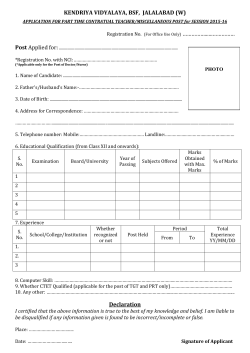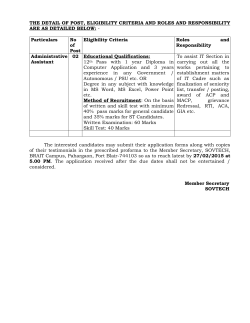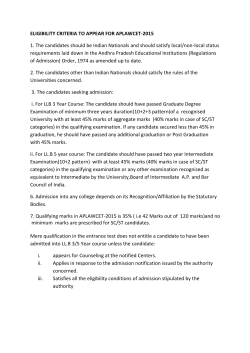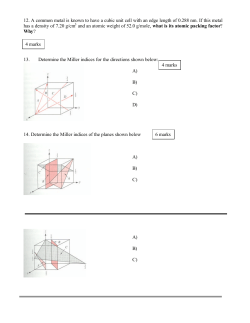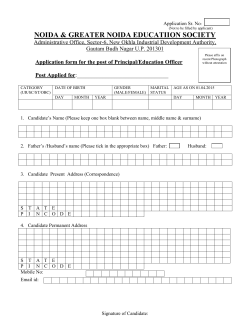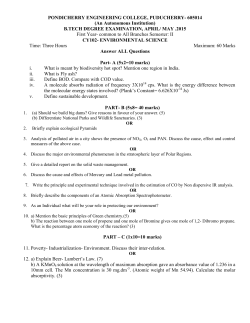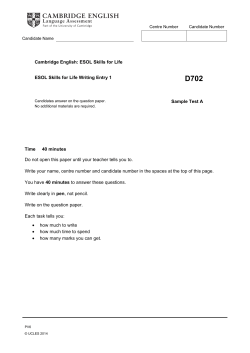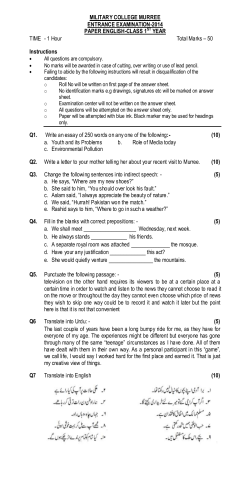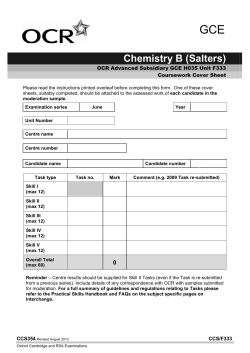
Website:- www.cdlu.ac.in
Syllabi & Scheme of Examination MA English-2nd Year 2014-2015 Website:- www.cdlu.ac.in SCHEME OF EXAMINATION MA- 2ND Year (English) (DISTANCE EDUCATION MODE) Paper Course Nomenclature Code EN-56 Literary Criticism Maximum Minimum Assignment Time Marks Marks 80 28 20 3 Hrs. and Theory EN-57 American Literature 80 28 20 3 Hrs. EN-58 Indian English Literature 80 28 20 3 Hrs. EN-59 British Literature 80 28 20 3 Hrs. 28 20 3 Hrs. in 20th Century EN-61 Literature and Gender 80 Paper –VI Literary Criticism and Theory Time - 3 Hrs. Max. Marks: 80 Note: The Candidate are required to attempt five questions in all. Besides question No. 10 in Section C Which is compulsory, the candidate shall attempt two questions each from sections A and B. All questions carry equal marks. Total marks for the paper are 80. Note: for Paper Setters 1. The question paper will consist of three section i.e. Section A, B and C. There shall be Ten questions in all. There shall be one question with internal choice on each of the nine Units prescribed in sections A and B. However, Q No. 10 in section C is compulsory. 2. Background Reading section aims at testing the candidates' understanding of important books/authors/trends/movements/subgenres related to this paper. The section will carry one compulsory question of 16 marks requiring the candidates to show acquaintance with any four of the six given items. The candidates are expected to write a paragraph of about 150 words on each of the four items they attempt. Section A Unit Unit Unit Unit Unit Section B I II III IV V Unit VI Unit VII Unit VIII Unit IX Aristotle: Poetics Ben Johnson: Preface to Shakespeare William Wordsworth: Preface to Lyrical Ballads S T Coleridge: Biographia Literaria PB Shelly: A Defence of Poetry New Criticism: (Chapter 4 and 10 of) I A Richard Principles of Literary Criticism Marxist Criticism: Julie Rivken and Micheal Ryan-“Introduction: Starting With Zero: Basic Marxism” From Literary Theory and Anthology. Deconstruction: M.H Abrams’ “The Deconstructive Angle.” Contemporary Literary Theory: Roland Barthes’ “The Death of the Author”. Section C Background reading: Oedipus Rex, Sir Philip Sidney, Claude Levi - Strauss, Michail Bakhtin, Rasa, Alamkara, "The Functions of Criticism at the Present Times" by Arnold, the functions of Criticism, From the Spectator to Post Structuralism" by Terry Eagleton, "International Fallacy" and "Effective Fallacy", "Against Theory" in Critical Inquiry, Suggested Reading: 1. 2. 3. 4. 5. 6. 7. 8. 9. 10. 11. George Waston: The Literal Critics R.A. Scott James; The making of Literature David Daiches: Critical Apporaches to literature J.W.H. Atkins: English Literature Criticism I.A. Richards: Principles of Literacy Criticim William Empson: Seven Types of Ambiguity Northrop Fry: Anatomy of Criticism David Lodge ed.: Twentieth Century Literacy Criticism Raymond Williams: Marxism and Literature M.H. Abrams: A Glossary of Contemporary Literary Theory Peter Barry: Begining Theory Paper - VII American Literature Time - 3 Hrs. Max. Marks: 80 Note: The Candidate are required to attempt five questions in all. Besides question No. 10 in Section C Which is compulsory, the candidate shall attempt two questions each from sections A and B. All questions carry equal marks. Total marks for the paper are 80. Note: for Paper Setters 1. The question paper will consist of three section i.e. Section A, B and C. There shall be Ten questions in all. There shall be one question with internal choice on each of the nine Units prescribed in sections A and B. However, Q No. 10 in section C is compulsory. 2. Background Reading section aims at testing the candidates' understanding of important books/authors/trends/movements/subgenres related to this paper. The section will carry one compulsory question of 16 marks requiring the candidates to show acquaintance with any four of the six given items. The candidates are expected to write a paragraph of about 150 words on each of the four items they attempt. Section A Unit I Unit II Unit III Unit IV Unit V Walt Whitman: 'Song of Myself' "Crossing Brooklyn Ferry." "Passage to India", When Lilacs Last in the Dooryard Bloomed". Emily Dickinson: "Because I could not wait for Death", "I' m saying every day", "It would never be common", "My Life had stood a Loaded Gun" Robert Frost; "Mending Wall", "Birches", "Stopping by Woods on a Snowy Evening", "Design", "The Road not Taken" Tennessee Williams: The Glass Menagerie Arthur Miller: Death of a Salesman Section B Unit Unit Unit Unit VI VII VIII IX Hemingway: A Farewell to Arms Fitzgerald: The Great Gatsby Faulkner: Light in August Toni Morrison: The Bluest Eye Section C Background Reading: Invisible Man by Ralph Ellison, The Portrait of a Lady by Henry James, Who's Afraid of Virginia Woolf? By Edward Albee, Saul Bellow, William Cooper. The Lost Generation, The Jazz Age, Walden by Thoreau, Harlem Renaissance, Wallace Stevens. Suggested Reading: 1. Harvey Pearce ed.: Whitman: A Collection of Critical Essays 2. Sacvan Bercovitch, The Cambridge Companion of American Literature 3. Marcus Cunliffe: History of American Literature 4. CWE Bigsby, Modern American Drama 5. I'O, Mathiessen: American Renaissance 6. Philip L Gerber, Critical Essays on Robert Frost 7. A.N. Kaul: The American Vision 8. Williard Throp: American Writing in the Twentieth Century. 9. John W. Aldridge: After the Lost Generation 10. Bernard W Bell, The Contemporary African American Novel; Its Folk roots and Modern Literary Branches. Paper - VIII Indian English Literature Time - 3 Hrs. Max. Marks: 80 Note: The Candidate are required to attempt five questions in all. Besides question No. 10 in Section C Which is compulsory, the candidate shall attempt two questions each from sections A and B. All questions carry equal marks. Total marks for the paper are 80. Note: for Paper Setters 1. The question paper will consist of three section i.e. Section A, B and C. There shall be Ten questions in all. There shall be one question with internal choice on each of the nine Units prescribed in sections A and B. However, Q No. 10 in section C is compulsory. 2. Background Reading section aims at testing the candidates' understanding of important books/authors/trends/movements/subgenres related to this paper. The section will carry one compulsory question of 16 marks requiring the candidates to show acquaintance with any four of the six given items. The candidates are expected to write a paragraph of about 150 words on each of the four items they attempt. Section A Unit I Beginnings of English Writings in India: Bankim Chander Chaterjee, Toru Dutt and Henry Derozio. None Fictional Prose: Swami Vivekanand; "Address at the Parilament of Religions" Sir Aurobindo: "Is India Civilized? Jawahar Lal Nehru: "The Coming of Gandhi: Satyagraha and Amritsar" and "In Naini Prison" in an Autobiography. Short Stories R.K Narayan "An Astrologer's Day" Arun Joshi: "The Only American from Our Village" Ruskin Bond: "An Island of Trees" Poetry: Nissim Ezekiel: "Enterprise", "Background, Casually" AK Ramanujam: "Self Portriat", "River", "Love Poem for a Wife" Jayant Mahapatra: "Hunger", "Dawn at Puri", "Indian Summer" Mahesh Dattani: Tara Unit II Unit III Unit IV Unit V Section B Unit Unit Unit Unit VI VII VIII IX Mulkh Raj Anand: Untouchable Raja Rao: Kanthapura Anita Desai: Clear Light of the Day Salman Rushdie: Midnight's Children Section C Background Reading: Rabindernath Tagore, Keki Daruwalla, R. Parthasarthi, GV Desani, Bhabani, Bhattacharya, Kamala Markandaya, Amitav Ghosh, The Autobiography of an Unknown Citizen, The Guide, Hind Swaraj. Suggested Reading: 1. 2. 3. 4. 5. 6. Meenakshi Mukherjee: Twice Born Fiction M.K Naik ed. A History of Indian English Literature R. Parthasarthy ed.: Ten Twentieth Century Indian Poets CD Narasimhaiah: The Swan and the Eagle K.R.S. lyenger, Indian Writing in English Makarand Paranjape: Towards a Poetics of the Indian Novel in English 7. 8. 9. M.K. Naik ed.: Aspects of Indian Writing in English K.K. Sharma ed.: Aspects of Indian Writing in English G.N. Agnihotri: Indian Life and Problems in the Novels of Mulk Raj Anand Raja Rao and R.K. Naryan. Paper - IX British Literature in the Twentieth Century Time - 3 Hrs. Max. Marks: 80 Note: The Candidate are required to attempt five questions in all. Besides question No. 10 in Section C Which is compulsory, the candidate shall attempt two questions each from sections A and B. All questions carry equal marks. Total marks for the paper are 80. Note: for Paper Setters 1. The question paper will consist of three section i.e. Section A, B and C. There shall be Ten questions in all. There shall be one question with internal choice on each of the nine Units prescribed in sections A and B. However, Q No. 10 in section C is compulsory. 2. Background Reading section aims at testing the candidates' understanding of important books/authors/trends/movements/subgenres related to this paper. The section will carry one compulsory question of 16 marks requiring the candidates to show acquaintance with any four of the six given items. The candidates are expected to write a paragraph of about 150 words on each of the four items they attempt. Section A Unit I Unit II T S Eliot: The Waste Land Dylan Thomas: "And Death Shall have no Dominion", "Poem in October", "Fern Hill", a Refusal to Mourn the Death, by Fire, of A Child in London". Philip Larkin: "I Remember, I Remember", "Toads", "Toads Revisited", "Church Going", "Whitsun Weddings" Samuel Backett: Waiting for Godot Harold Pinter: The Birthay Party Unit III Unit IV Unit V Section B Unit Unit Unit Unit VI VII VIII IX D H Lawrence: Sons and Lovers Joseph Conard: Heart of Darkness Aldous Huxley: Brave New World James Joyce: A Portrait of the Artist as a Young Man. Section C Background Reading: Modernism as a Literacy, Movement, Meta fiction, Existentialism and Novel, Angry Young Men, Mrs. Dalloway, David Lodge, The Age of Anxiety, Muriel Spark, Kingsley Amis, The Bloomsbury Group, Ted Hughes. Suggested Reading: 1. 2. 3. 4. 5. 6. 7. 8. 9. 10. 11. 12. Helen Gardner: 37k Art o/T.S. Eliot David Lodge: Graham Greene H.G. Earnshaw: Modern Writers A.C. Ward: Twentieth Century Literature Karl R. Frederick: A Reader's Guide to the Contemporary English Novel A.S. Collins: English Literature of Twentieth Century. B. Colvin Bedient: Eight Contemporary Poets Raymond Cowell: Twelve Modern Dramatists John Russell Taylor: Anger and After Boris Ford ed.: The Pelican Guide to Modern Literature Henry Reed: The Novels Since 1939. John Fuller: A Reader's Guide to W.H. Auden Paper - X Literature and Gender Time - 3 Hrs. Max. Marks: 80 Note: The Candidate are required to attempt five questions in all. Besides question No. 10 in Section C Which is compulsory, the candidate shall attempt two questions each from sections A and B. All questions carry equal marks. Total marks for the paper are 80. Note: for Paper Setters 1. The question paper will consist of three section i.e. Section A, B and C. There shall be Ten questions in all. There shall be one question with internal choice on each of the nine Units prescribed in sections A and B. However, Q No. 10 in section C is compulsory. 2. Background Reading section aims at testing the candidates' understanding of important books/authors/trends/movements/subgenres related to this paper. The section will carry one compulsory question of 16 marks requiring the candidates to show acquaintance with any four of the six given items. The candidates are expected to write a paragraph of about 150 words on each of the four items they attempt. Section A Unit I Unit II Unit III Emily Bronte: Jane Eyre Sylvia Plath, the poet: "Daddy", "Lady Lazarus", "Purdah", "Ariel", "The Colossus" Short Stories: Shashi Deshpande: "Miracle" Githa Hariharan: "Gajar Halwa" Subhadra Sengupta: "The Fourth Daughter" Alice Walker: The Colour Purple Margret Atwood: Surfacing Unit IV Unit V Section B Unit Unit Unit Unit VI VII VIII IX Mary Wollstonecraft Virginia Woolf Simone de Beauvoir Elaine Showalter Section C The First Wave of Feminism, The Second Wave of Feminism, Lesbanism, Eco Feminism, Gynocriticism, ecriture Feminine, Aphra Behn, Kamala Das, Sexual Politics by Kate Millett, womanism. Suggested Reading: 1. 2. 3. 4. 5. 6. 7. 8. Elaine Showalter: A Literature of their Own Sandra Gilbert and Susan Gubar: The Mad Woman in the Attic Patricia Stubbs: Women and Fiction K.K. Ruthwen: Feminist Literarcy Studies: An Introduction Mary Eagleton ed.: Feminist Literarcy Criticism Maggie Hum med.: Feminisims: A Reader Elaine Showalter: The New Feminist Criticism: Essays on Women Litera ture and Theory. Catherine Belsey and Jane Moore eds, The Feminist Reader: Essays in Gender and the Politics of Literary Criticism.
© Copyright 2026
